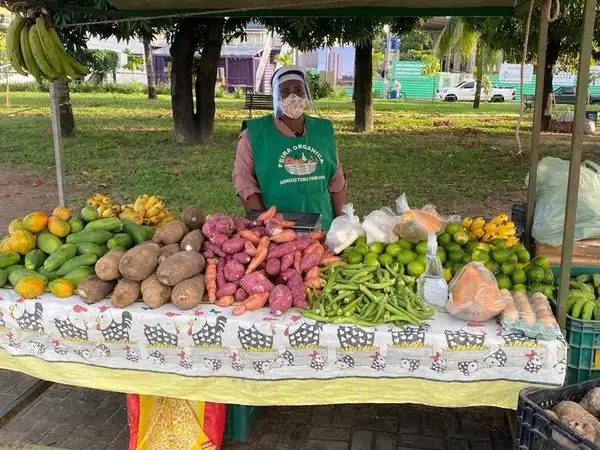Fix the food system
The global food system is broken. It doesn’t work for those who work the hardest – small farmers – and it’s a major driver of the climate emergency.


Paraíba in Brazil has become known as a leading example of economically viable, environmentally friendly farming.
Environmentally-friendly farming techniques are helping families in Brazil to survive a food crisis brought about by coronavirus and a changing climate.
Brazil has been one of the countries most badly affected by Covid-19. The poorest and most vulnerable have suffered disproportionately, both from the virus and the accompanying social and economic crisis. Many people lost their jobs and their livelihoods overnight. Consequently, hunger has been a visible sign of the crisis in Brazil as millions of families across the country found themselves without means to feed their families.
When coronavirus arrived in Paraíba, north-east Brazil, farmers in João Pessoa and other towns were left without a market as customers stayed away from the markets, which then shut altogether. Women and men who would transport their fresh organic produce by truck, motorbike and bicycle to the city each week suddenly found themselves with no buyers at the peak of the harvest, the time when they should be earning most of their money for the year. Tonnes of beautiful papaya, oranges, beans, sweet potato, cassava, corn, watermelon and bananas – so carefully tended - were in danger of rotting in the fields and gardens, and the farmers were facing ruin. Many would have despaired. But these were no ordinary farmers.
For the last 20 years, CAFOD’s long-term partner the Pastoral Land Commission (CPT) of João Pessoa has supported poor farmers to adopt agro-ecological principles of environmentally-friendly farming, form associations, and work together to strengthen the quality and quantity of their produce, develop new markets, and lobby local government for support with logistics and access to technical support. As a result, these farmers have opened a total of 60 regular organic fairs in the region since 2000, won important public contracts and sold direct to buyers. This support has transformed the quality and quantity of production, improving food security and enabling farmers to double their incomes in the last three years.
Rather than see their produce go to waste, these farmers have joined with local church groups, unions and social movements to organise the donation and distribution of fresh healthy produce for vulnerable families living on the periferia - on the edge of cities - and their neighbours in poorer rural communities, helping them survive this difficult time. Farmers who might have gone under have been able to find a market for their produce, and their organisations and communities have emerged with greater resilience.
Farming on agro-ecological principles is a whole-system change. Farmers avoid using chemical fertilisers, conserve and protect water sources, and carefully restore natural vegetation around springs. This is all essential in an arid land which - while always subject to cyclical drought, soil degradation and seasonal pests – is increasingly battered due to climate change. The adoption and making real and operational of agro-ecological principles has come about through trial and error, - farmers trying new things, learning from neighbours, taking part in meetings, working alongside and persuading government - not by revolution. Agro-ecology consciously values existing knowledge - Afro-Brazilian and indigenous farming practices – and mixes them up with new innovations.
As a result of the work of CPT and many other like-minded organisations, Paraíba has become known as a leading example of economically viable, environmentally friendly farming. Farmers and researchers come from all over Brazil to learn how one of the poorest states in Brazil has achieved this, and amid the current health, climate and biodiversity crises, the world still has much to learn from them.
The global food system is broken. It doesn’t work for those who work the hardest – small farmers – and it’s a major driver of the climate emergency.
Pray with us for a fairer global food system where everyone has enough.